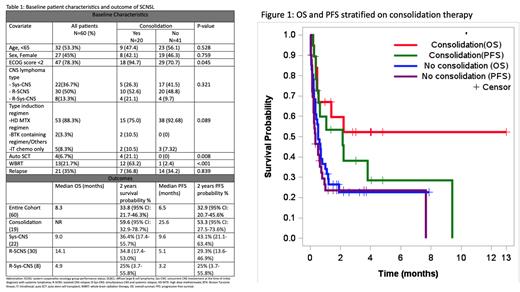Introduction
Secondary CNS lymphoma (SCNSL) remains a treatment challenge in patients (pts) with aggressive lymphoma. Outcome of SCNSL is poor. Pts are often treated with high dose Methotrexate (HD-MTX) based regimens followed by autologous stem cell transplant (auto SCT). However, the benefit of consolidation therapy is not well established. There is limited data on the treatments and outcomes of SCNSL. In this single institution study, we aim to analyze the role of consolidation therapy and potential prognostic factors of outcomes in SCNSL.
Method
All pts with a diagnosis SCNSL who presented to Moffitt Cancer Center, FL, USA between 2017 and 2022 were included. The hazard ratios (HRs) were evaluated in the univariate and multivariate analysis using the cox proportional hazard mode. All analyses were done using SAS 9.4.
Results
A total of 60 pts with SCNSL were identified. The median age was 63 years (range 26-83 years); 27 (45%) were female; 13 (21.7%) had Eastern cooperative oncology group performance status (ECOG) ≥2. Entire cohort was divided in 3 subgroups: pts with concurrent CNS involvement at the time of initial diagnosis with systemic lymphoma (Sys-CNS) [22 (36.7%)]; pts with isolated CNS relapse (R-SCNS) [30 (50.0%)]; and pts with simultaneous CNS and systemic relapse (R-Sys-CNS) [8 (13.3%)]. 31 (51.7%) pts had brain parenchymal involvement, 24 (40%) had leptomeningeal disease, 4 (6.7%) had both leptomeningeal and parenchymal involvement, and 1 (1.7%) had ocular disease. 58(96.6%) pts had diffuse large B cell lymphoma (DLBCL) histology; 9 (15%) had DLBCL with MYC and BCL2 rearrangement; 10 (16.7%) had DLBCL MYC and BCL2 expression.
For induction therapy of SCNSL, 53 (88.3%) of pts received HD MTX-based chemotherapy; 2 (3.3%) received Bruton tyrosine kinase inhibitor (BTKi), and 5 (8.3%) with meningeal disease alone received IT chemotherapy and/or rituximab(R). Sys-CNS pts also received R-CHOP or DA-R-EPOCH while R-Sys-CNS pts received R-Polatuzumab or Polatuzumab-R-Bendamustine. 20 (33.3%) received consolidation either by WBRT [13 (21.7%)] or auto SCT [4 (6.7%)]; 3 (5.0%) proceeded with chimeric antigen receptor (CAR-T) therapy.
The overall response rate (ORR) for entire cohort was 55.2% (34.5% complete response CR and 20.7% partial response PR). However, improved ORR and CR were observed with 14(73.68%) and 9 (47.37%) respectively in pts who received consolidation. ORR and CR for pts with Sys-CNS, R-SCNS, R-Sys-CNS were 13 (61.9%)/ 10 (47.6%), 14 (48.3%)/9 (31%) and 2 (25%)/ 2 (25%), respectively.
After a median follow up of 33.6 months, median OS was 8.3 months with a 2-year survival probability of 33.8% (95% CI: 21.7-46.3%); the PFS was 6.5 months with a 2-year PFS probability of 32.9% (95% CI: 20.7-45.6%). Consolidation therapy with either auto SCT or WBRT had significant survival benefit. In this subgroup, median OS is not reached (NR) and the 2-year OS probability was 59.6% (95% CI: 32.9-78.7%); median PFS was 25.6 months and 2-year PFS probability was 53.3% (95% CI: 27.5-73.6%). After the first-line therapy for CNS disease, 21(35%) pts experienced relapsed. However, relapse rate in consolidation group [7 (36.8%)] was almost similar to those who did not receive consolidation [14 (34.2%)] (table 1). 39 (65%) pts died; 29 (48.33%) from disease progression, 3 (5%) from therapy related side effect and 7(11.7%) from other causes.
In the univariate analysis, ECOG PS ≥2 [HR 3.60 (CI:1.80-7.20), p<0.001], lack of consolidation therapy [2.45 (CI:1.12-5.36), p=0.024], <3 cycles of HD-MTX containing regimen [2.85 (CI: 1.47-5.520), p=0.002] and double hit lymphoma [2.27 (CI: 1.02-5.06), p=0.045] were associated with worse OS. In the multivariate analysis, R-SYS-CNS, <3 cycles of HD-MTX, ECOG ≥2 and lack of consolidation remained significant. Lack of consolidation and receiving <3 cycles of HD-MTX were associated with inferior PFS in both univariate and multivariate analysis (figure 1).
Conclusion
Outcomes of aggressive B cell lymphoma with CNS involvement remain poor. The median OS was 8.3 months in our cohort. After adjusting for confounding factors, receiving >3 cycles of HD-MTX based regimen and consolidation with either WBRT or auto SCT were associated with improved outcomes. Pts with simultaneous CNS and systemic relapse had worse OS. Prospective studies are needed to evaluate optimal treatment for SCNSL.
Disclosures
Jaglal:SOBI: Membership on an entity's Board of Directors or advisory committees; Janssen: Membership on an entity's Board of Directors or advisory committees; Agios: Membership on an entity's Board of Directors or advisory committees. Saeed:Morphosis: Honoraria; Novarits: Consultancy; Epizyme: Consultancy. Shah:DSMC, Pepromene Bio: Membership on an entity's Board of Directors or advisory committees; Incyte, Jazz Pharmaceuticals, Kite/Gilead, SERVIER: Research Funding; Pharmacyclics/Janssen, Spectrum/Acrotech, BeiGene, Gilead Sciences: Honoraria; Celgene, Novartis, Pfizer, Janssen, Seattle Genetics, AstraZeneca, Stemline Therapeutics, Kite/Gilead: Other: Travel, Accommodations, Expenses; Moffitt Cancer Center: Current Employment; Takeda, AstraZeneca, Adaptive Biotechnologies, BMS/Celgene, Novartis, Pfizer, Amgen, Precision Biosciences, Kite/Gilead, Jazz Pharmaceuticals, Century Therapeutics, Deciphera, Autolus Therapeutics, Lilly, Pepromene: Consultancy. Pinilla-Ibarz:AstraZeneca: Consultancy, Speakers Bureau; Secura Bio: Consultancy, Speakers Bureau; AbbVie: Consultancy, Speakers Bureau; Takeda: Consultancy, Speakers Bureau; Lilly: Consultancy, Speakers Bureau; Beigene: Consultancy, Speakers Bureau; Genentech: Speakers Bureau. Chavez:Kite/Gilead: Membership on an entity's Board of Directors or advisory committees; Karyopharm: Membership on an entity's Board of Directors or advisory committees; Genmab: Honoraria; Epizyme: Speakers Bureau; Lilly: Honoraria; Cellectar: Membership on an entity's Board of Directors or advisory committees; BMS: Membership on an entity's Board of Directors or advisory committees, Speakers Bureau; Beigene: Membership on an entity's Board of Directors or advisory committees, Speakers Bureau; Astra Zeneca: Research Funding; ADC Therapeutics: Membership on an entity's Board of Directors or advisory committees, Research Funding; Adaptive: Research Funding; Merck: Research Funding; Morphosys: Speakers Bureau; Novartis: Membership on an entity's Board of Directors or advisory committees. Dong:EUSA Pharma, a Recordati Group company.: Research Funding; Robert A. Winn Diversity in Clinical Trials Career Development Award, funded by Gilead Sciences: Research Funding.


This feature is available to Subscribers Only
Sign In or Create an Account Close Modal